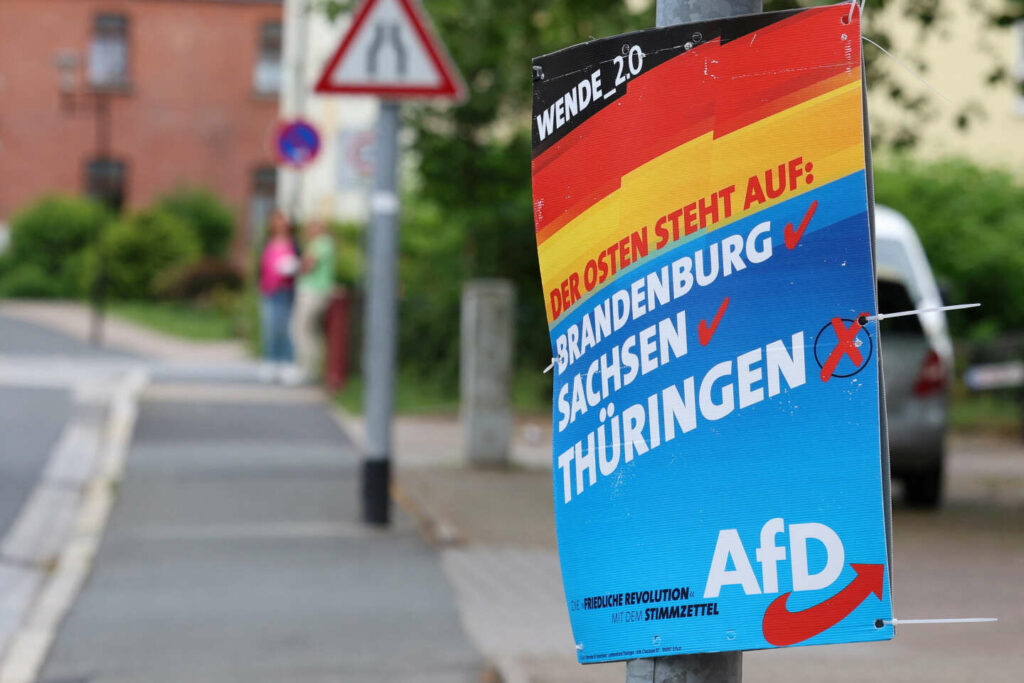Thirty-four years after reunification, Germany remains politically split in two. In the European elections held on June 9, the far-right AfD party came first in the former East Germany (29.7%) but only fourth (13%) in the part of the country formerly west of the Iron Curtain. First nationwide (30%), the conservative right (CDU-CSU) clearly won in the West (31.5%) but it only came second in the East, almost nine points behind the AfD.
The very high scores recorded by the far right in former East Germany have come as no surprise, nor are they confined to this part of the country. “The AfD has done very well in the former West Germany, particularly in certain areas of Bavaria or Hesse, where demographics are aging and industry is faltering,” said Hans Vorländer, a professor of political science and history at the University of Dresden. “But it’s true that in the East there’s another factor: A feeling of lack of consideration, the idea that reunification was achieved on people’s backs, as if there had been a kind of colonization by West Germany over East Germany,” Vorländer said.
Read more Subscribers only Euro 2024: From fairytales to a model in crisis, football holds a mirror up to German society
In view of the AfD’s results, the setbacks that have marred its campaign (opening of two investigations against its lead candidate for illegal financing from Russian and Chinese sources, statements by the latter downplaying the criminal nature of the SS, revelations of a remigration plan fomented by the party to deport millions of Germans of foreign origin to North Africa) have hardly done it any disservice. “Perhaps without these scandals, the AfD would have obtained a few more votes, but what we have to note is that it has clearly progressed compared to the 2019 European elections [with 15.9% of the vote, an increase of five points], and that, for a whole section of the electorate, the fact that it is a far-right party suspected of being Kremlin-sponsored is absolutely not a repellent factor,” said Johannes Kiess, professor of sociology at the University of Leipzig and specialist in the far right.
Pacifist rhetoric
In Germany, the European elections also saw the emergence of a new party, the Sahra Wagenknecht Alliance (BSW), named after a former leader of the left-wing Die Linke party, which garnered 6.2% nationwide and 13.8% in the former East Germany alone. In recent weeks, there was one big question on people’s mind: With its very left-wing stance on social issues, but very conservative on societal questions, with immigration at the forefront, would this new party stem the AfD surge? In view of Sunday’s results, the answer has been rather mixed. “It seems that BSW has rather attracted former Social-Democratic Party voters [Chancellor Olaf Scholz’s SPD], people who once voted for Die Linke or ex-abstentionists, but not massively AfD voters,” said Kiess. “Contrary to what many people had thought or hoped, Wagenknecht’s party attracted fairly few AfD voters, but it mainly appealed to people who voted for Die Linke, the SPD or even the CDU,” said Benjamin Höhne, a professor of political science at the University of Chemnitz, in Saxony.
You have 40.54% of this article left to read. The rest is for subscribers only.
Source link : https://www.lemonde.fr/en/international/article/2024/06/14/european-elections-highlight-germany-s-political-divide-between-east-and-west_6674764_4.html
Author :
Publish date : 2024-06-14 03:30:05
Copyright for syndicated content belongs to the linked Source.
